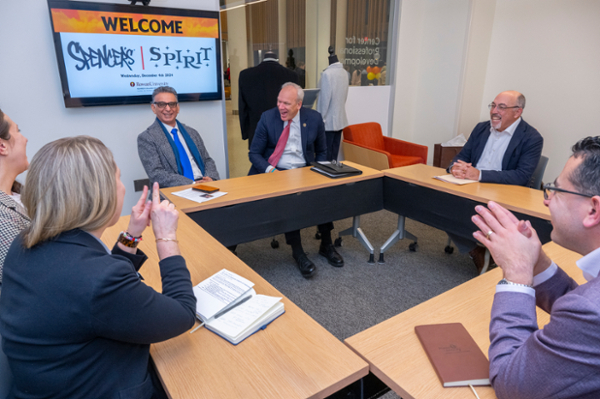Spencer’s CEO offers a lesson in business and life
Spencer’s CEO offers a lesson in business and life

Steven Silverstein, CEO of iconic shopping mall fixture Spencer’s and the massive seasonal Spirit Halloween pop-up chain, had a simple message for nearly 200 students in the Rohrer College of Business – follow your heart and treat people right.
Invited to campus Dec. 4 for the college’s annual Evening with an Executive program, the chief executive of Egg Harbor Township-based Spencer’s and Spirit Halloween said he parlayed a summer work experience at his grandparents’ Daytona Beach motel into a legendary retail career.
“I just loved it,” he said of the early experience and the connection he felt, even then, with the public. “I was 14 years old, selling people rooms.”
After college, the native New Yorker said, he landed an interview with financial services giant Merrill Lynch and in preparation for that interview took a “practice interview” with Macy’s corporate office. Realizing then how much he loved the day-to-day customer interaction and in-person sales experience of retail, Silverstein knew what he had to do.
“I told Merrill no, and Macy’s let’s go,” he said.
After several years with Macy’s (and later Bloomingdale’s), Silverstein, who since graduating college returned to school for his MBA, became president of retailer Linens-N-Things before joining Spencer’s as CEO in 2003.
Then owned by Universal Studios, he said Spencer’s was floundering, under assault by merchants like Amazon and Walmart and a general ambivalence by the shopping public toward malls.
Still, Silverstein said, he saw a future for both Spencer’s and Spirit Halloween.
“I am a died-in-the-wool, brick-and-mortar retailer,” he said. “Yes, you can shop on your phone, but it is not the same thing as in-person.”
Slipping into a colorful, blinking holiday sweater, Silverstein said both the Spencer’s and Spirit Halloween shopping experiences are about much more than gag gifts and costumes. At both stores, he said, shoppers come in to browse, to be entertained, and often to buy.
“We don’t sell a thing people need,” he said with a smile. “(But) we sell things you have to have… If I’m doing my job, you’re going to walk out with things you didn’t expect to buy.”
Founded in 1947, Spencer’s today has nearly 700 stores in the U.S. and Canada. Spirit Halloween, which was founded in 2003, operates some 1,500 seasonal “pop-up” stores, typically in vacant retail space, that have come to define the Halloween season.
“August 1 is the official start of Halloween because we say it is,” he said.
Treating people right
Silverstein said a big part of the company’s success comes from doing what’s right for the customer base and its employees. He said the company since 2007 has raised more than $145 million for children in hospitals and puts a premium on employees, from interns to seasonal workers to longtime, salaried professionals.
The worst day of his career, he said, was finding out that, due to the pandemic in early 2020, the company would have to shutter all stores, move to a “zero revenue model,” and take drastic actions to save cash and cut costs. This involved mass furloughs, a hiring freeze, and wage reductions for employees who were not laid off.
But by the end of July, he said, the company called back all furloughed employees and planned to pay back all lost wages.
The company saw those wage cuts as a loan, Silverstein said, “and we paid our loans back.”
Silverstein, who gave students attending the program a free Spencer’s/Spirit bookbag and sweatshirt, advised them to expect to make mistakes and even to be ready to fail.
“Don’t think when you walk in on your first day that you know all you need to know,” he said. “You’re there to learn, to ask questions, so don’t be shy. I’m here, 40 years later, and I still ask questions and learn every day.”